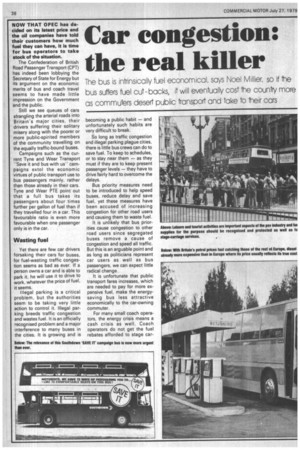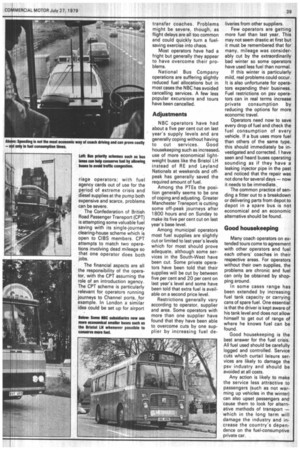Car congestion: the real killer
Page 40

Page 41

If you've noticed an error in this article please click here to report it so we can fix it.
The bus is intrinsically fuel economical, says Noel Millier, so if the bus suffers fuel cut-backs, it will eventually cost the country more as commuters desert public transport and take to their cars
NOW THAT OPEC has decided on its latest price and the oil companies have told their customers how much fuel they can have, it is time for bus operators to take stock of the situation.
The Confederation of British Road Passenger Transport (CPT) has indeed been lobbying the Secretary of State for Energy but its argument on the economic merits of bus and coach travel seems to have made little impression on the Government and the public.
Still we see queues of cars strangling the arterial roads into Britain's major cities, their drivers suffering their solitary misery along with the poorer or more public-spirited members of the community travelling on the equally traffic-bound buses.
Campaigns such as the current Tyne and Wear Transport "Save it and bus with us" campaigns extol the economic virtues of public transport use to bus passengers mainly, rather than those already in their cars. Tyne and Wear PTE point out that a full bus takes its passengers about four times further per gallon of fuel than if they travelled four in a car. This favourable ratio is even more favourable when one passenger only is in the car.
Wasting fuel
Yet there are few car drivers forsaking their cars for buses, for fuel-wasting traffic congestion seems as bad as ever. If a person owns a car and is able to park it, he will use it to drive to work, whatever the price of fuel, it seems.
Illegal parking is a critical problem, but the authorities seem to be taking very little action to control it. Illegal parking breeds traffic congestion and wastes fuel. It is an officially recognised problem and a major interference to many buses in the cities. It is growing and is becoming a public habit — and unfortunately such habits are very difficult to break.
So long as traffic congestion and illegal parking plague cities, there is little bus crews can do to save fuel. To keep to schedules, or to stay near them — as they must if they are to keep present passenger levels — they have to drive fairly hard to overcome the delays.
Bus priority measures need to be introduced to help speed buses, reduce delay and save fuel, yet these measures have been accused of increasing congestion for other road users and causing them to waste fuel.
It is unlikely that bus priorities cause congestion to other road users since segregated buses remove a cause of congestion and speed all traffic. But this is an arguable point and as long as politicians represent car users as well as bus passengers, we can expect little radical change.
It is unfortunate that public transport fares increases, which are needed to pay for more expensive fuel, make the energysaving bus less attractive economically to the car-owning commuter.
For many small coach operators, the energy crisis means a cash crisis as well. Coach operators do not get the fuel rebates afforded to stage car riage operators; with fuel agency cards out of use for the period of extreme crisis and diesel supplies at the pump both expensive and scarce, problems can be severe.
The Confederation of British Road Passenger Transport (CPT) is attempting some valuable fuel saving with its single-journey clearing-house scheme which is open to CIBS members. CPT attempts to match two operations involving dead mileage so that one operator does both jobs.
The financial aspects are all the responsibility of the operator, with the CPT assuming the role of an introduction agency. The CPT scheme is particularly relevant for operators running journeys to Channel ports, for example. In London a similar idea could be set up for airport transfer coaches. Problems might be severe, though, as flight delays are all too common and could quickly turn a fuelsaving exercise into chaos.
Most operators have had a fright but generally they appear to have overcome their problems.
National Bus Company operations are suffering slightly reduced fuel allocations but in most cases the NBC has avoided cancelling services. A few less popular excursions and tours have been cancelled.
Adjustments
NBC operators have had about a five per cent cut on last year's supply levels and are generally coping without having to cut services. Good housekeeping such as increased. use of more economical lightweight buses like the Bristol LH instead of RE and Leyland Nationals at weekends and offpeak has generally saved the required amount of fuel.
Among the PTEs the position generally seems to be one of coping and adjusting. Greater Manchester Transport is cutting some off-peak journeys after 1800 hours and on Sunday to make its five per cent cut on last year's base level.
Among municipal operators most fuel supplies are slightly cut or limited to last year's levels which for most should prove adequate, although some services in the South-West have been cut. Some private operators have been told that their supplies will be cut by between five per cent and 20 per cent on last year's level and some have been told that extra fuel is available on a second price level.
Restrictions generally vary according to operator, supplier and area. Some operators with more than one supplier have found that they have been able to overcome cuts by one supplier by increasing fuel de liveries from other suppliers.
Few operators are getting more fuel than last year. This may not seem drastic at first but it must be remembered that for many, mileage was considerably cut by the extraordinarily bad winter so some operators have used less fuel than normal.
If this winter is particularly mild, real problems could occur. It is also unfortunate for operators expanding their business. Fuel restrictions on psv operators can in real terms increase private consumption by reducing the options for more economic travel.
Operators need now to save every drop of fuel and check the fuel consumption of every vehicle. If a bus uses more fuel than others of the same type, this should immediately be investigated and corrected. I have seen and heard buses operating sounding as if they have a leaking injector pipe in the past and noticed that the repair was not done for several days — now it needs to be immediate..
The common practice of sending a fitter out to a breakdown or delivering parts from depot to depot in a spare bus is not economical and an economic alternative should be found.
Good housekeeping
Many coach operators on extended tours come to agreement with other operators and fuel each others' coaches in their respective areas. For operators without their own supplies, the problems are chronic and fuel can only be obtained by shopping around.
In some cases range has been extended by increasing fuel tank capacity or carrying cans of spare fuel. One essential is that the driver is kept aware of his tank level and does not allow himself to get out of range of where he knows fuel can be found.
Good housekeeping is the best answer for the fuel crisis. All fuel used should be carefully logged and controlled. Service cuts which curtail leisure services are likely to damage the psv industry and should be avoided at all costs.
Any action is likely to make the service less attractive to passengers (such as not warming up vehicles in the winter) can also upset passengers and cause them to look for alternative methods of transport — which in the long term will damage the industry and increase the country's dependence on the fuel-consumptive private car.








































































































